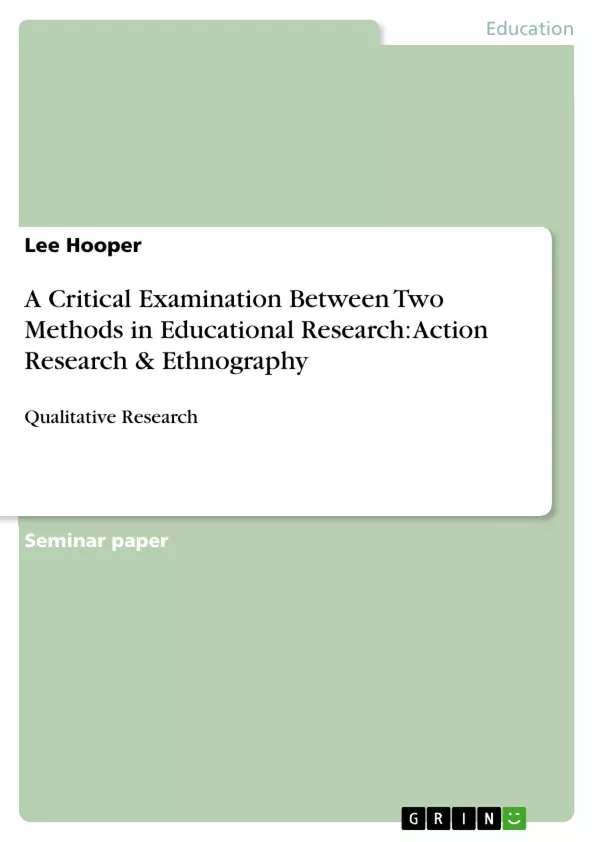Action Research (AR) is a term used to denote a methodical system of investigation and reflection, performed by individuals for their own professional practice and development. It encompasses a social philosophy that is centered on acquiring practical knowledge that can be applied to concrete situations. The goals of AR can be generalized into three potential outcomes: “Improving practice, improving understanding of practice, and improving the situation in which the practice takes place”.
Table of Contents
- Action Research - Introduction & Definition
- Key Concepts & Distinctive Features
- Role of the Researcher
- Main Data Collecting Techniques
- Critical Analysis
- Ethnography – Introduction & Definition
- Key Concepts & Distinctive Features
Objectives and Key Themes
This text provides a critical examination of two qualitative research methods in education: action research and ethnography. It aims to explore the theoretical underpinnings, practical applications, strengths, and limitations of each method. The text aims to provide a comprehensive understanding of these methods for educators and researchers seeking to engage in qualitative research. Key themes covered include: * **The cyclical nature of action research and its potential for improving educational practices.** * **The distinctive features of ethnographic research and its focus on understanding culture in educational settings.** * **The role of the researcher in both methods, including their involvement in the research process and their impact on the participants.** * **The strengths and weaknesses of each method, including issues related to bias, data collection, and ethical considerations.** * **The potential applications of action research and ethnography for understanding and addressing social and political issues in education.**Chapter Summaries
Action Research - Introduction & Definition
This section introduces the concept of action research (AR) as a systematic approach to investigation and reflection that aims to improve educational practices. It highlights the social philosophy underlying AR and outlines its potential outcomes: improved practice, understanding, and educational environments.Key Concepts & Distinctive Features
This section delves into the cyclical process of AR, illustrating the iterative nature of data collection, analysis, and action. It presents different models for conducting AR, emphasizing its focus on practical knowledge and its application to real-world situations.Role of the Researcher
This section examines the role of the researcher in AR, differentiating between reflective practitioners who focus on micro-level change and critical theorists who aim for macro-level change. It underscores the importance of collaboration and empowerment in AR, with researchers acting as insiders rather than outsiders.Main Data Collecting Techniques
This section explores the diverse data collection techniques employed in AR, emphasizing the constant analysis of data throughout the research process. It highlights the use of inductive analysis and dialectical approaches to understand the relationship between various elements in the educational environment.Critical Analysis
This section analyzes the strengths and weaknesses of AR. Strengths include its ability to bridge theoretical gaps with practical applications and foster self-critical communities. Weaknesses include time constraints, potential bias, reliability concerns, and ethical considerations related to confidentiality and ownership of academic ideas.Ethnography – Introduction & Definition
This section defines ethnography as a research method that recognizes the influence of culture on society. It emphasizes the role of culture in shaping collective ideas, beliefs, and perceptions within various communities.Key Concepts & Distinctive Features
This section discusses the use of fieldwork as a fundamental aspect of ethnographic research. It highlights the researcher's attempt to immerse themselves in the daily lives of participants to gather data on their natural behaviors and interactions.Keywords
This text focuses on qualitative research methodologies in education, specifically action research and ethnography. Key terms include: qualitative research, action research, ethnography, educational practice, cultural understanding, researcher roles, data collection, data analysis, strengths, weaknesses, and ethical considerations.Frequently Asked Questions
What is Action Research (AR) in an educational context?
Action Research is a methodical system of investigation and reflection performed by educators to improve their own professional practice, understanding, and the educational environment.
How does Ethnography differ from Action Research?
While AR focuses on active improvement and change from an insider's perspective, Ethnography focuses on understanding the culture and natural behaviors within a community through immersive fieldwork.
What are the main goals of Action Research?
The three primary outcomes are improving practice, improving the understanding of that practice, and improving the situation or environment where the practice occurs.
What is the role of the researcher in Action Research?
In AR, the researcher acts as an "insider" or collaborator, often being a reflective practitioner who seeks to bridge the gap between theory and real-world application.
What are some limitations of Action Research?
Potential weaknesses include time constraints, researcher bias, concerns regarding data reliability, and ethical issues related to confidentiality and ownership of ideas.
- Citar trabajo
- Lee Hooper (Autor), 2013, A Critical Examination Between Two Methods in Educational Research: Action Research & Ethnography, Múnich, GRIN Verlag, https://www.grin.com/document/262264



